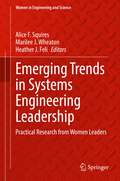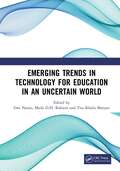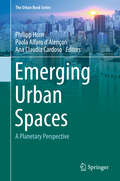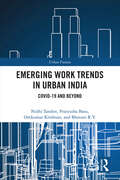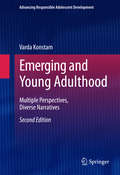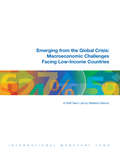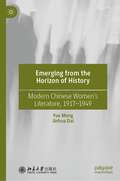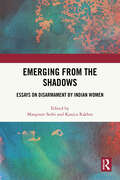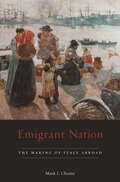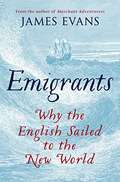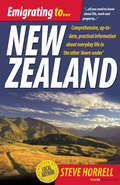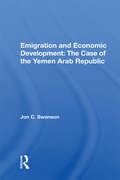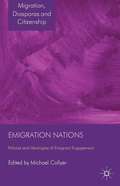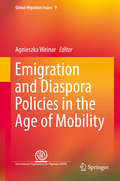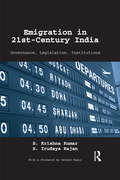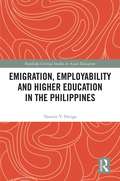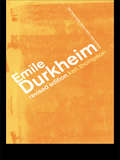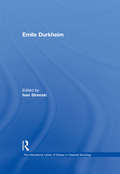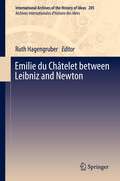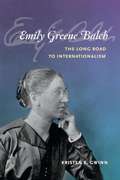- Table View
- List View
Emerging Trends in Systems Engineering Leadership: Practical Research from Women Leaders (Women in Engineering and Science)
by Marilee J. Wheaton Alice F. Squires Heather J. FeliThis book celebrates the efforts of women in the international systems engineering community. While there are dozens of books that tackle the topic of systems engineering and thousands of books that address leadership, this book is unique. Emerging Trends in Systems Engineering Leadership: Practical Research from Women Leaders presents personal, well-researched, hands-on perspectives of emerging trends in systems engineering leadership from industry, government, and academia, covering timely topics applicable across many domains – all under one cover. This book presents material for engineers, scientists, technologists, and others to help them tackle challenges in their everyday work dealing with complex socio-technical systems. The book provides guidance for leaders on shoring up essential (soft) skills to address the increasing demand for professional competencies; addresses diversity, equity, inclusion, and empowering women in the workforce; discusses broader facets of systems engineering leadership including systems thinking, ethics and utilitarianism; and investigates the impact of emerging technological change on systems resilience and the digital enterprise. This book provides a multi-perspective approach for leaders to navigate a changing world and develop and deliver optimal system solutions to global societal challenges that meet human needs. To this end, the authors extend beyond the solid technical base to encompass the human aspect of system behavior. This book is written by twenty-six female authors (three of whom also serve as the editors) from around the world at varying career stages who share their research, achievements, perspectives, and successes in emerging areas of systems engineering leadership.Testimonials:“As the systems that modern society depends on get more complicated and complex, we are in the midst of a renaissance with regard to research relating to systems engineering and science. A vast majority of this research is focused on the development of a modern toolkit for systems engineers today and into the future. This takes the form of new and improved methods, models, methodology, processes and tools. This research is critical but likely insufficient without a focus on the most valuable resource with regard to systems engineering within any organization – the human resource. Therein lies the focus of this textbook. It addresses systems engineering leadership from a variety of perspectives, while also addressing broad aspects relating to mentoring and the necessary evolving competencies that we need to address in today’s workforce. This emphasis makes this book unique. The icing on the cake is that all the chapters in this textbook are written by contemporary women leaders – this provides a necessary and unique perspective on the topic of leadership – that is long overdue! I highly recommend this textbook to all my colleagues in academia, industry, and government.”Dinesh Verma, Ph.D.Professor, Systems Engineering, School of Systems and EnterprisesExecutive Director, Systems Engineering Research Center (SERC)Stevens Institute of Technology, Hoboken, NJ 07030“The past decade has seen a dramatic increase in the number of women who are formally recognized in systems engineering technical, management and leadership positions in all sectors. With industry, academia, professional systems engineering societies and publishers enabling and illuminating the growing and substantial contributions of women in engineering, women have unprecedented opportunities today to contribute to systems engineering in both leadership and management positions. This volume, a compendium of chapters written by enterprising international women leaders at various stages in their career, addresses diverse topics such as leadership, management, empowerment, equity, diversity, inclusion, and mentoring. It is a valuable resource f
Emerging Trends in Technology for Education in an Uncertain World: Proceedings of the 6th International Conference on Education in Muslim Society, (ICEMS 2020), Jakarta, Indonesia, 18-19 November 2020
by Dwi NantoPresently, people are facing a condition called VUCA (Volatility, Uncertainty, Complexity, and Ambiguity) where this condition is described as a turbulent, uncertain, complicated, unclear condition. The world of work and industry is changing quickly, driven by the development of technology, information and communication. Advances in computer technology, artificial, intelligence, robotics which is also called as the industrial revolution 4.0 eras, are of significant influence on environment and people. A time where humans must learn quickly, and an era where the future is unpredictable, where choices for various conditions are increasing and mindsets are changing.The big challenge for educational institutions, especially Islamic educational institutions today, is how to prepare young people on various aspects of cognitive, mental, and spiritual preparedness to face the changing environment. Development in the real world is far more complex than what is learned in the classroom, so it is necessary to educate and transform curriculum that is directed in accordance with the demands of present times. The 6th International Conference on emerging trends in technology for education in facing VUCA (Volatility, Uncertainty, Complexity, and Ambiguity) is designed not only to share research, but also to offer recommendations to governments, educational institutions and other stakeholders to improve the quality of education through technology-based educational programs. The conference was held by Faculty of Education UIN Syarif Hidayatullah Jakarta. Scholars, researchers, policy makers, teachers, and students from various countries participated and worked together to discuss how to improve the quality of education in the Muslim community. Guided by UIN Jakarta, the 6th ICEMS of 2020 provided opportunities for various educational stakeholders especially in Muslim Communities around the world to share their creative and innovative works, opinions, and experiences in open academic forums.
Emerging Urban Spaces: A Planetary Perspective (The Urban Book Series)
by Philipp Horn Paola Alfaro D’Alençon Ana Claudia CardosoThis edited collection critically discusses the relevance of, and the potential for identifying conceptual common ground between dominant urban theory projects – namely Neo-Marxian accounts on planetary urbanization and alternative ‘Southern’ post-colonial and post-structuralist projects. Its main objective is to combine different urban knowledge to support and inspire an integrative research approach and a conceptual vocabulary which allows understanding the complex characteristics of diverse emerging urban spaces. Drawing on in-depth case study material from across the world, the different chapters in this volume disentangle planetary urbanization and apply it as a research framework to the context-specific challenges faced by many `ordinary' urban settings. In addition, through their focus on both Northern- and Southern urban spaces, this edited collection creates a truly global perspective on crucial practice-relevant topics such as the co-production of urban spaces, the ‘right to diversity’ and the ‘right to the urban’ in particular local settings.
Emerging Work Trends in Urban India: COVID-19 and Beyond (Urban Futures)
by Nidhi Tandon Pratyusha Basu Omkumar Krishnan Bhavani R.V.This book offers an overview of India’s emerging digital economy and the resulting challenges and opportunities for urban workplaces. It examines contemporary economic and social transformations in India by focusing on how new technologies and policies are shaping urban work practices and patterns. The book emphasizes inclusive and equitable practices that consider the needs of the formal and informal sector workforce as essential to India’s urban development. Drawing on cross-disciplinary frameworks, it examines key issues related to work trends in the Indian urban economy and its digital landscapes, including Industry 4.0 and technology–labour nexus, smart cities and innovation, urbanism and consumerism, workplace transitions such as service industry and remote work, digital divide, skill development initiatives, and the impact of socio-economic inequalities and disruptions. The authors provide perspectives on the digital future of urban work in India and other emerging economies in the post-COVID-19 phase, and underscore the importance of enacting balanced policies, remodelling institutions, and equipping the labour force for adapting to new demands related to future employability and investments. This book will interest students, teachers, and researchers of urban studies, urban sociology, sociology of work, labour studies, human and urban geography, economic geography, urban economics, development studies, urban development and planning, public policy, regional planning, politics of urban development, social and cultural change, urban sustainability, environmental studies, management studies, South Asian Studies, and Global South studies. It will also be useful to policymakers, non-governmental organizations, activists, and those interested in India and the future of the global economy.
Emerging and Young Adulthood
by Varda KonstamThe most distinctive feature of the Second Edition is its theoretical orientation coupled with a focus on understanding emerging and young adulthood from multiple perspectives. The updated and expanded book offers readers an opportunity to "listen to the voices" of emerging and young adults, parents, and employers, which is key to understanding this particular developmental period. In addition, the case studies provided throughout the book are diverse and detailed. The issues of emerging adulthood are complicated, nuanced, and defy easy characterizations. This book provides an opportunity to debunk many established pernicious stereotypes about emerging and young adults. The presentation of diverse voices and case material serves as a springboard for discussion and engages readers with material depicting emerging adults in the throes of working through developmental challenges characteristic of this period. In addition, the recent economic downturn has created havoc and further instability in the lives of emerging and young adults. The Second Edition focuses on the effects of - as well as possible solutions to - unemployment on emerging and young adults. A new chapter focuses on career experimentation versus career floundering, which is an important distinction. Additional new chapters address the effects of technology as well as depression and anxiety on emerging and young adults. The Second Edition examines emerging and young adulthood within a larger developmental and ecological context. In addition, it ensures that readers are well positioned to understand how the developmental demands of this period intersect with current economic, social, and political realities. It is a must-have resource for developmental, clinical child and school psychologists, rehabilitation counselors and therapists, I/O psychologists, and sociologists as well as for researchers and graduate-level students across these various disciplines.
Emerging from the Global Crisis: Macroeconomic Challenges Facing Low-Income Countries
by Stefania FabrizioThis report from the International Monetary Fund on the impact of the global economic crisis on low income countries (LICs) examines the strengths and weaknesses of their positions relative to previous downturns. The volume considers the pre-crisis positions of the LICs and discusses the relatively mild effects of the current economic climate on some developing countries compared to wealthier states more deeply integrated with global financial infrastructures. The work includes numerous charts and tables as well as appendices providing relevant statistical data. Annotation ©2011 Book News, Inc. , Portland, OR (booknews. com)
Emerging from the Horizon of History: Modern Chinese Women’s Literature, 1917–1949
by Jinhua Dai Yue MengThis book systematically studies the literary output of female writers in contemporary China within the frame of literary theories of feminism. With tools from psychoanalysis, structuralism and deconstructionism, the two female authors, Meng and Dai, analyze 9 important female writers from 1919 to 1949, including Yin Lu, Xin Bing, Ning Ding, Ailing Zhang. By decade, the authors provide a comprehensive depiction of these female writers' historic-cultural background as well as their reception by critics and audiences. Navigating the complex relation between mainstream literary trends and female writers’ practice, this text represents a landmark of practice of literary feminist criticism within the Chinese language.
Emerging from the Shadows: Essays on Disarmament by Indian Women
by Manpreet Sethi Kanica RakhraNational security, war and strategy are mostly considered male preserves across the world even when, as professional scholars or policy practitioners, women have made significant contributions. Women voices and the subject of disarmament have been hidden in the shadows of mainstream security discourse for far too long. The book seeks to right-stream these by bringing together writings of women security experts, scholars and diplomats in India on issues of nuclear disarmament and non-proliferation. International efforts towards sustainable nuclear non-proliferation and disarmament are struggling to find the ‘right’ way. This book shifts the focus to the imperative of disarmament with women authors who share their perspectives on what the future for disarmament looks like and where India—a leading voice on disarmament—stands on these issues. The volume explores India’s nuclear disarmament journey; efforts towards and roadblocks in the implementation of nuclear disarmament verification; confidence building and nuclear risk reduction measures as pathways towards disarmament; nuclear energy and proliferation trends; linkage between nuclear non-proliferation and disarmament; and India’s commitment towards the Women, Peace and Security agenda.This volume will be of great interest to students and scholars, researchers, policymakers and members of the diplomatic community, in the fields of security and strategic studies, international relations, politics, disarmament diplomacy and nuclear policy.
Emigrant Nation: The Making of Italy Abroad
by Mark I. ChoateBetween 1880 and 1915, thirteen million Italians left their homeland, launching the largest emigration from any country in recorded world history. As the young Italian state struggled to adapt to the exodus, it pioneered the establishment of a “global nation”—an Italy abroad cemented by ties of culture, religion, ethnicity, and economics.In this wide-ranging work, Mark Choate examines the relationship between the Italian emigrants, their new communities, and their home country. The state maintained that emigrants were linked to Italy and to one another through a shared culture. Officials established a variety of programs to coordinate Italian communities worldwide. They fostered identity through schools, athletic groups, the Dante Alighieri Society, the Italian Geographic Society, the Catholic Church, Chambers of Commerce, and special banks to handle emigrant remittances. But the projects aimed at binding Italians together also raised intense debates over priorities and the emigrants’ best interests. Did encouraging loyalty to Italy make the emigrants less successful at integrating? Were funds better spent on supporting the home nation rather than sustaining overseas connections?In its probing discussion of immigrant culture, transnational identities, and international politics, this fascinating book not only narrates the grand story of Italian emigration but also provides important background to immigration debates that continue to this day.
Emigrants and Exiles: Ireland and the Irish Exodus to North America
by Kerby A. MillerRich in human detail, penetrating in analysis, this book is social history on an epic scale. The first "transatlantic" history of the Irish, Emigrants and Exiles offers the fullest account yet of the diverse waves of Irish emigration to North America. Drawing on enormous original research, Miller focuses on the thought and behavior of the "ordinary" Irish emigrants, as revealed in their personal letters, diaries, journals, and memoirs as well as in their songs, poems and folklore. Miller shows that the exile mentality was deeply rooted in Irish history, culture and personality, and it profoundly affected both the traumatic course of modern Irish history and the Irish experience in America.
Emigrants: Why the English Sailed to the New World
by James Evans'Marvellously engaging' The Times'Brisk, informative and eye-opening' Daily TelegraphIn the 1600s, vast numbers of people left England for the Americas. Crossing the Atlantic was a major undertaking, the voyage long and treacherous. Why did they go?Emigrants casts vivid new light on the population shift which underpins the rise of modern America. Using contemporary sources including diaries, court hearings and letters, James Evans brings us the extraordinary personal stories of the men and women who made the journey of a lifetime.
Emigrants: Why the English Sailed to the New World
by James EvansAN EVENING STANDARD NO. 1 BESTSELLER'Marvellously engaging' THE TIMES'Brisk, informative and eye-opening' DAILY TELEGRAPHDuring the course of the seventeenth century nearly 400,000 people left Britain for the Americas, most of them from England. Crossing the Atlantic was a major undertaking, the voyage long and treacherous. There was little hope of returning to see the friends and family who stayed behind. Why did so many go? A significant number went for religious reasons, either on the Mayflower or as part of the mass migration to New England; some sought their fortunes in gold, fish or fur; some went to farm tobacco in Virginia, a booming trade which would enmesh Europe in a new addiction. Some went because they were loyal to the deposed Stuart king, while others yearned for an entirely new ambition - the freedom to think as they chose. Then there were the desperate: starving and impoverished people who went because things had not worked out in the Old World and there was little to lose from trying again in the New. EMIGRANTS casts light on this unprecedented population shift - a phenomenon that underpins the rise of modern America. Using contemporary sources including diaries, court hearings and letters, James Evans brings to light the extraordinary personal stories of the men and women who made the journey of a lifetime.
Emigrating To New Zealand
by Steve HorrellThis book is an indispensible guide to the roller coaster ride that is the emigration process. It covers all the topics and issues that anyone thinking of emigrating to New Zealand will need to know about, from the discussion phase through to making friends when you're there. - Deciding to go - Applying for a visa - Preparing to leave - Taking your pets - Arriving in New Zealand - House hunting and buying - Education and health - Cars and driving - Profiles of major cities and regions This thoroughly revised and updated new edition now includes a new chapter on how to find a job in New Zealand.
Emigrating To New Zealand: An Independent Guide
by Steve HorrellThis book is an indispensible guide to the roller coaster ride that is the emigration process. It covers all the topics and issues that anyone thinking of emigrating to New Zealand will need to know about, from the discussion phase through to making friends when you're there. - Deciding to go - Applying for a visa - Preparing to leave - Taking your pets - Arriving in New Zealand - House hunting and buying - Education and health - Cars and driving - Profiles of major cities and regions This thoroughly revised and updated new edition now includes a new chapter on how to find a job in New Zealand.
Emigration And Economic Development: The Case Of The Yemen Arab Republic
by Jon C. SwansonAlthough social scientists tend to agree that emigration improves the standard of living of migrants and their families, research suggests that more generally it has a neutral or even negative effect on economic development in the home country. The Yemen Arab Republic is a case in point: while living standards there have improved with emigration, t
Emigration Nations
by Michael CollyerUntil very recently emigrants were considered an embarrassment, an irritation or an irrelevance by most states. The long experience of emigrant engagement in certain historical emigration countries, such as Italy, was very much the exception. Since about 2000, countries around the world have shown much greater enthusiasm for policies to encourage the loyalty of nationals who have made a permanent home elsewhere. These developments have changed the relationship between state institutions and emigrant nationals. Policies of emigrant engagement also challenge fundamental understandings about the nature of political society in the modern era; the notion of states as territorial institutions or the understanding of citizenship as membership in a territorially bounded polity are both undermined. This book provides copious evidence of this process, with detailed, comparable case studies of twelve countries and a new theoretical framework that helps explain changing policies towards emigrants.
Emigration and Diaspora Policies in the Age of Mobility
by Agnieszka WeinarThis volume examines the ways different countries around the world have responded to rising numbers of mobile citizens. Complete with detailed case studies, it provides a groundbreaking and global analysis of emigration and diaspora policies in the 21st century. First, an introduction considers factors that determines a state's policy choices. It draws on rich empirical material to present readers with information on the determinants of policy definition and implementation, reactions to emigration, and converging and diverging trends. Next, the volume offers detailed case studies from 15 countries around the world, including Argentia, Vietnam, Senegal, the Russian Federation, Denmark, and Turkey. Coverage for each country critically analyzes its emigration or diaspora policies as well as how these policies affect its mobile citizens. The contributors also place the policies in context and explore the consequences of pertinent rules and provisions. In addition, a conclusion presents a comparative analysis of all case studies as well as details a set of best practices. Emigration and immigration are two sides of the same coin that every country experiences and, in one way or the other, must face. This book offers readers a new look on diaspora and emigration governance across the globe and explores the future paradigm of reactions to emigration.
Emigration and Political Development
by Jonathon W. MosesWhile policy makers, international organizations and academics are increasingly aware of the economic effects of emigration, the potential political effects remain understudied. This book maps the nature of the relationship that links emigration and political development. Jonathon W. Moses explores the nature of political development, arguing that emigration influences political development. In particular, he introduces a new cross-national database of annual emigration rates and analyzes specific cases of international emigration (and out-migration within countries) under varying political and economic contexts.
Emigration in 21st-Century India: Governance, Legislation, Institutions
by S. Irudaya Rajan S. Krishna KumarEmigration in 21st-Century India is the first definitive exposition of contemporary Indian labour migration. The book provides a comprehensive appraisal of the policies, legislation and institutional architecture governing emigration at both federal and state levels. It posits that, geographically, emigration is now a more inclusive, pan-India phenomenon with many distinct features. It draws critical attention to the multiple dualities in Indian emigration, showing how the artificial distinction between a universal pravasi (‘expatriate’ or ‘migrant’) and a restricted aam pravasi (‘common emigrant’) distorts emigration governance. On the basis of extensive data from the Kerala Migration Survey (KMS) and National Sample Survey Organisation (NSSO) Rounds, it projects the emerging profile of the emigrant from new source states as also the likely number of migrants by 2021, drawing cross-country comparisons where appropriate. The work will be invaluable to scholars of migration and diaspora studies, economics, development studies and sociology, as well as policy makers, administrators, academics, and non-governmental organisations in the field.
Emigration, Employability and Higher Education in the Philippines (Routledge Critical Studies in Asian Education)
by Yasmin Y. OrtigaThis book investigates the dilemma of educating students for future work in the context of the Philippines, one of the top sources of migrant labor in the world. Here, colleges and universities are expected to not only educate students for jobs within the country, but for potential employers beyond national borders. It demonstrates how human capital ideology reinforces such export-oriented education, creating an assumed relationship among academic credentials, overseas opportunity, and future migrant remittances. Findings indicate that attempts to produce migrant workers undermine the job security of college instructors, skew local curriculum towards foreign requirements, and challenge efforts to develop academic programs in line with local needs. As more developing nations turn to migration as a development strategy, colleges and universities face increasing pressures to produce future migrant workers who will have an advantage over other nationalities. This book emphasises the importance of understanding how this global phenomenon affects colleges and universities, as well as the teachers and students within these institutions. This book raises important questions on the role of universities in today’s global economy and the effects of contemporary migration flows on developing countries.
Emile Durkheim
by Prof Kenneth ThompsonThis book examines Durkheim's considerable achievements and situates them in their social and intellectual contexts, with a concise account of the major elements of Durkheim's sociology. The book includes a critical commentary on the four main studies which exemplify Durkheim's contribution to sociology: The Division of Labour in Society; Suicide; The Rules of Sociological Method and The Elementary Forms of Religious Life.
Emile Durkheim (The International Library of Essays in Classical Sociology)
by Ivan StrenskiA new appreciation of Durkheim, now into its fourth decade, has extended our grasp of his intellectual ambitions beyond standard academic boundaries. Contributions to this revival of interest in Durkheim, many secreted away in obscure periodicals, are well worth being recognized for their unqualified excellence in helping us to uncover the original Durkheimian intellectual project in all its interdisciplinary complexity. Besides classic Durkheimian subjects such as religion, social solidarity and suicide, these studies bring to light Durkheim's intellectual inquiry into political theory, comparative ethnology, social reconstruction, questions of civil society, and his articulation of an updated individualism in conversation with Marx, Hegel, Spencer and others. Authors who have helped us attain this more rounded conception of the Durkheimian project include such well-known figures as Robert N. Bellah, Robert Alun Jones, Anthony Giddens, W. S. F. Pickering and Edward Tiryakian. More than matching these contributions are the surprising writings by authors from across the disciplines, including such contemporaries of Durkheim as historian Henri Berr and theologian Alfred Loisy, as well as modern-day writers who deserve to be much better known, such as philosopher, John Brooks III or historian John Bossy. Although this collection is overwhelmingly drawn from sources in English, two classic critical pieces by French contemporaries of Durkheim enhance the value of this anthology.
Emile Durkheim: Zur Bestimmung der französischen Soziologie in Deutschland (René König Schriften. Ausgabe letzter Hand #8)
by René KönigIm letzten Viertel des 19. Jahrhunderts entsteht ein neues Krisenbewusstsein der entwickelten Gesellschaften, die einen raschen sozialen Wandel durchlaufen. Gesellschaftstheoretische Entwürfe werden im Namen einer neuen Wissenschaft ausformuliert, für die sich die Bezeichnung "Soziologie" rasch durchsetzt. Neben die ältere Statistik tritt sozialwissenschaftliche Forschung, die der theoretischen Anleitung bedarf. Für René König hat vor allem der die empirische Forschung anleitende Entwurf Emile Durkheims paradigmatische Bedeutung für die Entwicklung einer humanistischen Zielen zustrebenden Gesellschaft, so dass sich König immer wieder an diesem Entwurf einer an Tatsachen orientierten Soziologie mit theoretischem Anspruch und moralischem Profil orientiert hat. In diesem Band werden Königs Schriften zu Durkheim und zur französischen Soziologie versammelt. Zusätzlich wird sein reiches Schaffen an Diskussionsbeiträgen und Rezensionen sichtbar gemacht.
Emilie du Châtelet between Leibniz and Newton
by Ruth HagengruberEmilie du Châtelet was one of the most influential woman philosophers of the Enlightenment. Her writings on natural philosophy, physics, and mechanics had a decisive impact on important scientific debates of the 18th century. Particularly, she took an innovative and outstanding position in the controversy between Newton and Leibniz, one of the fundamental scientific discourses of that time. The contributions in this volume focus on this "Leibnitian turn". They analyze the nature and motivation of Emilie du Châtelet's synthesis of Newtonian and Leibnitian philosophy. Apart from the Institutions Physiques they deal with Emilie du Châtelet's annotated translation of Isaac Newton's Principia. The chapters presented here collectively demonstrate that her work was an essential contribution to the mediation between empiricist and rationalist positions in the history of science.
Emily Greene Balch: The Long Road to Internationalism
by Kristen E. GwinnA well-known American academic and cofounder of Boston's first settlement house, Emily Greene Balch was an important Progressive Era reformer and advocate for world peace. Balch served as a professor of economics and sociology at Wellesley College for twenty years until her opposition to World War I resulted with the board of trustees to refusing to renew her contract. Afterwards, Balch continued to emphasize the importance of international institutions for preventing and reconciling conflicts. She was awarded a Nobel Peace Prize in 1946 for her efforts in cofounding and leading the Women's International League for Peace and Freedom (WILPF). In tracing Balch's work at Wellesley, for the WILPF, and for other peace movements, Kristen E. Gwinn draws on a rich collection of primary sources such as letters, lectures, a draft of Balch's autobiography, and proceedings of the WILPF and other organizations in which Balch held leadership roles. Gwinn illuminates Balch's ideas on negotiated peace, internationalism, global citizenship, and diversity while providing pointed insight into her multifaceted career, philosophy, and temperament. Detailing Balch's academic research on Slavic immigration and her arguments for greater cultural and monetary cohesion in Europe, Gwinn shows how Balch's scholarship and teaching reflected her philosophical development. This first scholarly biography of Balch helps contextualize her activism while taking into consideration changes in American attitudes toward war and female intellectuals in the early twentieth century.
